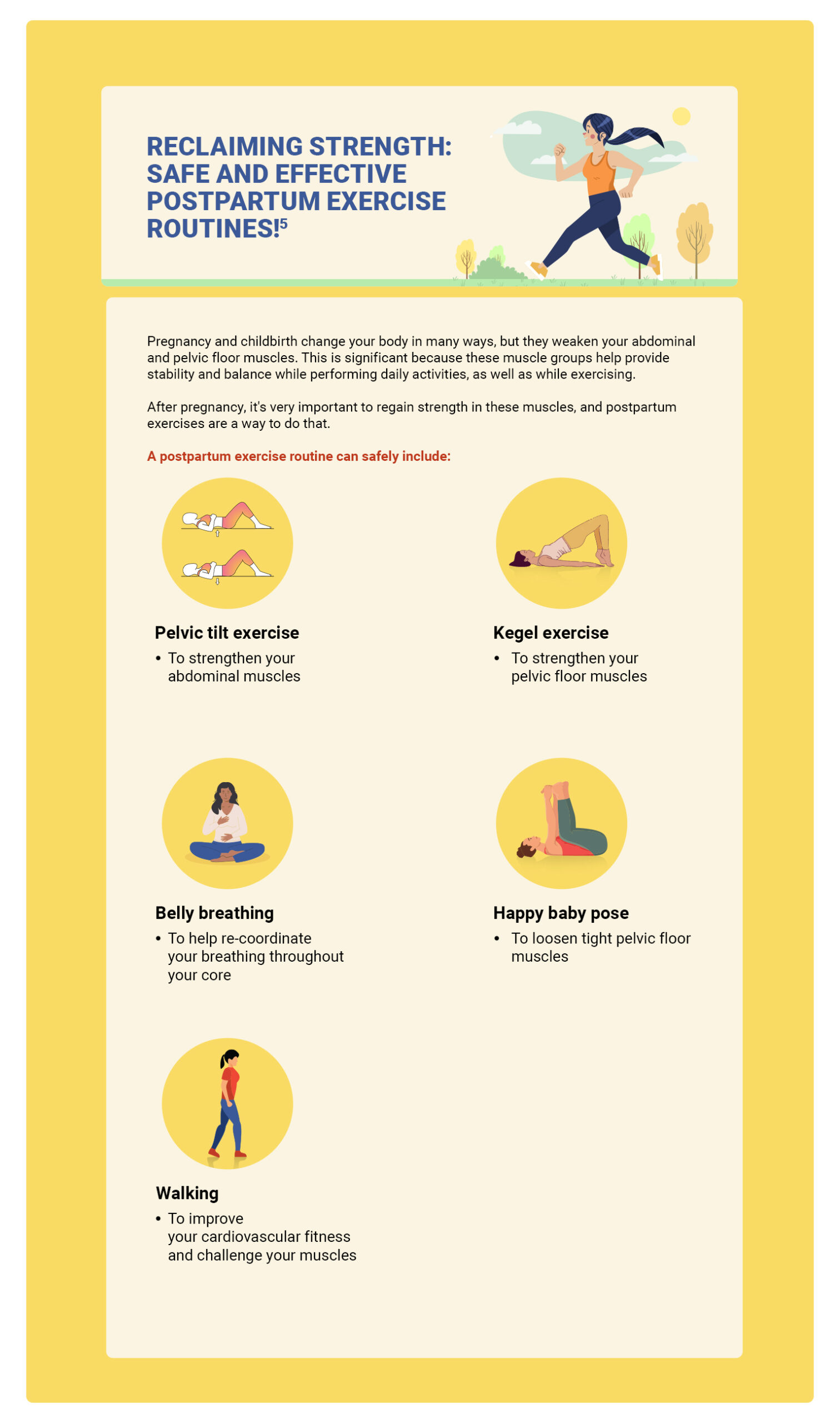Embracing the Postpartum Journey
4 min read
Essential Postpartum Care and support for New Mothers!
The postpartum period begins after the delivery of your baby and ends when your body has nearly returned to its pre-pregnant state. This period often lasts 6 to 8 weeks.1
The postpartum period involves your moving through many changes, both emotionally and physically. You are also learning how to deal with all the changes needed with becoming a new mother.1
You need to take good care of yourself to rebuild your strength. You will need plenty of rest, good nutrition, and help during the first few weeks.1
Rest1
- In the first few weeks, you need to let someone else take care of all responsibilities other than feeding your baby and taking care of yourself.
- Sleep when the baby sleeps. This may be only a few minutes of rest several times a day, but these minutes can add up.
- Save steps and time. Have your baby's bed near yours for feedings at night.
- It’s nice to have visits from friends and family, but don’t feel that you need to entertain guests. Feel free to excuse yourself for a nap or to feed your baby.
- Get outside for a few minutes each day. You can start walking and doing postpartum exercises, as advised by your healthcare provider.
Nutrition1
- Your body has undergone many changes during pregnancy and birth. You need time to recover. In addition to rest, you need to eat a healthy diet to help you do that.
- The weight gained in pregnancy helps build stores for your recovery and for breastfeeding. After delivery, you need to eat a healthy and balanced diet so you can be active and able to care for your baby.
- Most lactation experts recommend that you eat when you are hungry. But many mothers may be so tired or busy that food gets forgotten. So, it is important to plan simple, healthy meals.
Other things to remember as a part of your after-delivery care include:2
- Wait to have intercourse until after your first check-up appointment: Your body needs time to heal after giving birth and waiting a few weeks to have sex is a part of that healing process.
- Discussing birth control: It might seem strange to think that you could get pregnant again soon after birth, particularly if your period hasn’t returned yet. But you absolutely can. Often, your provider will talk to you about birth control options before your baby is even born.
- Not douching or using tampons in the first few weeks after birth: You shouldn’t insert a tampon or douche in the first four to six weeks after delivery. Using pads to catch blood or discharge is the safest method.
- Continue taking your prenatal vitamins every day: If you run out of prenatal vitamins, you can take a multivitamin containing iron.
- Eat healthy meals: A healthy diet will help you recover. It’s also recommended that you avoid alcohol and caffeine during this time.
- Drink eight large glasses of fluid each day: Water, juice and milk are all good choices when you’re trying to accomplish this goal.
- Take a walk: It’s good to take a break from the house and get a little exercise. Walking is a gentle way to start exercising again after delivery. Talk to your healthcare provider about when you can safely start a new exercise program and how much activity you can do at a time.
Also follow the given tips for healing process post-surgery:3
- Drink 8-10 glasses of water daily.
- Expect vaginal discharge.
- Avoid stairs and lifting until your doctor says these activities are OK.
- Don't take a bath or go swimming until the doctor says it's OK.
- Don't drive until your doctor says it's OK. Also wait until you can make sudden movements and wear a safety belt properly without discomfort.
- If the incision becomes red or swollen, call your doctor.
Postpartum depression and mental health2
Postpartum depression is a common condition that impacts many new birth parents. It’s a complex mix of physical, emotional and behavioral changes that can happen after childbirth, causing you to feel depressed. You might also hear the phrase “baby blues” used to explain a shift in some people’s emotions after birth. Feelings of sadness, anxiety, hopelessness, guilt, and fatigue can all be a part of postpartum depression.
If you experience any of the following feelings or thoughts, reach out to your healthcare provider right away:
- A depressed mood for most of the day, every day for two weeks.
- Difficulty doing typical tasks around the house for your own self-care or for your baby.
- Thoughts of harming yourself or your baby. This includes thoughts of suicide.
- Thoughts of hopelessness, anxiety, guilt, panic or worthlessness.
It’s important to talk to others if you experience changes to your emotions after delivery. Reaching out to friends, family or your healthcare provider can be difficult sometimes, but you’ll often find these people want to help you.
Breastfeeding and formula feeding4
Choosing whether to breastfeed or formula feed their baby is one of the biggest decisions expectant and new parents will make.
Health experts believe breast milk is the best nutritional choice for infants. But breastfeeding may not be possible for all women. For many, the decision to breastfeed or formula feed is based on their comfort level, lifestyle, and specific medical situations.
Breastfeeding
A number of health organizations — including the American Academy of Pediatrics (AAP), the American Medical Association (AMA), and the World Health Organization (WHO) — recommend breastfeeding as the best choice for babies. Breastfeeding helps defend against infections, prevent allergies, and protect against a number of chronic conditions.
The AAP recommends that babies be breastfed exclusively for the first 6 months. Beyond that, breastfeeding is encouraged until at least 12 months, and longer if both the mother and baby are willing.
Here are some of the many benefits of breastfeeding:
- Fighting infections and other conditions: Breastfed babies have fewer infections and hospitalizations than formula-fed infants.
- Nutrition and ease of digestion: Often called the "perfect food" for a human baby's digestive system, breast milk's components — lactose, protein (whey and casein), and fat — are easily digested by a newborn.
- Free: Breast milk doesn't cost a cent, while the cost of formula quickly adds up.
- Different tastes: Nursing mothers usually need 300 to 500 extra calories per day, which should come from a wide variety of well-balanced foods. This introduces breastfed babies to different tastes through their mothers' breast milk.
- Convenience. With no last-minute runs to the store for more formula, breast milk is always fresh and available whether you're home or out and about.
- "Skin-to-skin" contact: Many nursing mothers really enjoy the experience of bonding so closely with their babies. And the skin-to-skin contact can enhance the emotional connection between mother and infant.
- Beneficial for mom, too: The ability to totally nourish a baby can help a new mother feel confident in her ability to care for her baby.
Formula feeding
Commercially prepared infant formulas are a nutritious alternative to breast milk, and even contain some vitamins and nutrients that breastfed babies need to get from supplements.
Here are other reasons women may choose to formula feed:
- Convenience: Either parent (or another caregiver) can feed the baby a bottle at any time.
- Flexibility: Once the bottles are made, a formula-feeding mother can leave her baby with a partner or caregiver and know that her little one's feedings are taken care of.
- Diet: Women who opt to formula feed don't have to worry about the things they eat or drink that could affect their babies.
5 food categories to include in your postpartum diet1

Vegetables
2









